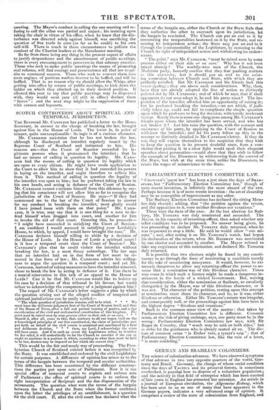PARLIAMENTARY ELECTION COMMITTEE LAW.
" CROWNER'S 'quest law" has been a jest since the days of &LUC-. SPERE; but "Parliamentary Election Committee law' though of more recent invention, is infinitely the more absurd of the two. Perhaps because it is of more recent invention : the art of absurdity may be as susceptible of improvement as any other.
The Sudbury Election Committee has declared the sitting Mem- ber duly elected ; adding, that "the petition against the return, and the opposition to it, were neither frivolous nor vexatious."
These were the facts of the case. At the last election for Sud- bury, Mr. TOMLINE was duly nominated and seconded. The Ma■ or, in his capacity of returning-officer, then asked whether any other candidate was to be proposed. No answer being given, he was proceeding to declare Mr. TOMLINE duly returned, when he was requested to stop a little. He said he would allow "one mi- nute"; and, after noting it on Mr. TOMLINE'S watch, had begun his declaration of the return, when Mr. BAGSHAW was nominated by one elector and seconded by another. The Mayor refused to take any cognizance of this nomination, and declared Mr. TOMLINE duly returned. It is possible that two electors might be found in any consti- tuency to go through the form of nominating a candidate merely for the sake of occasioning annoyance. It would-, however, be ex- tremely dangerous to allow any returning-officer the power to as- sume that a nomination was of this frivolous character. Times may come in which such a licence might be made a dangerous in- strument in the hands of a wicked Government. But, waiving that consideration, either the nomination at Sudbury, so cavalierly disregarded by the Mayor, was of this frivolous character, or it was not. The character of the petition, resting upon this attempt at nomination, must share its character, and be, as it was, either frivolous or otherwise. Either Mr. TOMLINE'S return was irregular, and consequently null, or the proceedings against him have been in the highest degree "frivolous and vexatious."
Such is the common sense view of the matter : that taken by Parliamentary Election Committee law is different. Common sense, at the risk of giving umbrage, says, one party must be in the wrong : Parliamentary Election Committee law says, with Sir Roger de Coverley, that "much may be said on both sides," but in dubio let the gentleman who is already seated sit on. The dic- tum of common sense "is Ercles' vein, a tyrant's vein " : that of Parliamentary Election Committee law, like the vein of a lover, "is more condoling."


























 Previous page
Previous page